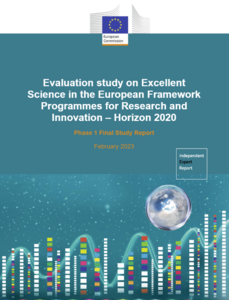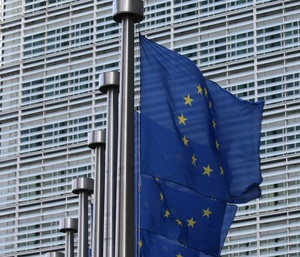Results from a new evaluation study
In 2020, the EU’s EUR 80 billion research and innovation funding programme Horizon 2020 came to a close after running since 2014. Now, as its successor Horizon Europe kicks into gear, analyses and learnings from the original programme are being put forth to inform how this next Horizon can put its EUR 95.5 billion to best effect, and how the lessons learned can be used in Horizon Europe’s successor FP10.

Cover page of the EC’s Phase 1 Final Study Report. Source: Publications Office of the European Union
In this vein, the European Commission recently published the “Phase 1 Final Study Report: Evaluation Study of the European Framework Programmed for Research and Innovation for Excellent Science – Horizon 2020.” A large team of experts from UNU-MERIT along with its project partners, Idea Consult and PPMI, worked on several aspects of the study (see end of this article), focusing on if and how different flagship projects, programme parts and funding bodies contributed to “Excellent Science.” As one of Horizon 2020’s three core pillars along with Industrial Leadership and Societal Challenges, Excellent Science is defined by the Commission as that which supports the EU’s position as a world leader in science through frontier science, breakthrough ideas, and top researchers from Europe and beyond.
The report as a whole found Horizon 2020’s contributions to science to be relevant, coherent, efficient, effective and providing added value. The programme supported impact-oriented research addressing Europe’s challenges and priorities (relevance); tackled societal and cross-cutting issues by having its different programmes complement one another (coherence); was cost-effective and quick to conclude grant agreements (efficiency); produced a significant amount of peer-reviewed publications across its three pillars, with the most coming from Excellent Science (effective); and facilitated research that was large-scale and more complex than if said research had been funded by the Member States separately (adding value).
Key takeaways
Among the findings and recommendations that the study puts forth for future work programmes are the following:
- Excellent science should continue to be a core part of future programmes in order to keep driving Europe forward as a global center of research and innovation. Participation remains low, however, in widening countries.
- Horizon 2020’s biggest challenge was oversubscription, with proposals far exceeding available grants. Strengthening the Seal of Excellence – a quality label given to high-ranking projects Horizon 2020 could not fund due to budgetary constraints – as well as widening funding sources from national funding bodies could help tackle this bottleneck.
- Projects that aimed to help develop the skills of researchers could benefit from clearer strategies, objectives, operalisation and targets.
- Open science – which currently focuses on using digital and collaborative technologies to spread knowledge as soon as it is available – should continue to be promoted and explained.
- There stands room for improving the monitoring of the programme’s impact in terms of inducing change at various institutional, organizational and governance levels, as well as in terms of data collection on how Horizon 2020’s actions were communicated.
- Implementing Responsible Research and Innovation (RRI) could benefit from increased focus on its different components, including knowledge hubs for each, as well as clearer targets.
- The Marie Skłodowska-Curie Actions (MSCA), a funding mechanism that helps boost the career of early career researchers, should be further developed in order to enhance its capacity building and academic enhancement objectives.
- Funders may need to reflect on how to increase the additionality of European Research Council grants, aimed at funding excellence science.

EU flags at the European Commission Berlaymont building. Photo: Guillaume Périgois
The findings and results of this study report will assist the Commission in their policies, programming and budgeting for future Horizon programmes as well as offer insights into how the current Horizon Europe could be fine-tuned to better achieve its goals.
———————————————————————————————————————————————–
The UNU-MERIT team that contributed to this report consists of the following researchers, PhD fellows, and affiliated staff: Davide Bonaglia, Diego Chavarro, Tommaso Ciarli, Nordine Es-Sadki, Kirsten Haaland, Ad Notten, Bulat Sanditov, Fabiana Visentin, Lili Wang, René Wintjes and Yagmur Yildiz.
Under the overall project leadership of PPMI and partnering with Idea Consult, the team worked on several aspects of the study, among which are two case studies on the H2020 Flagship projects “Graphene” and “Human Brain Project”, a bibliometric analysis assessing the efficiency of the H2020 programme parts and funding bodies, and two separate counterfactual analyses, consisting of multiple econometric models each with a different focus and different level of sophistication. The first analysis consists of a productivity model that looks at Horizon 2020 as a whole and its programmes in particular, while the second analysis is focused on the ERC and MSCA-IF (sub-)programmes, and uses several estimation strategies to assess their impact on funded researchers. This analysis looks at the impact of Horizon 2020 funding using pre- and post-grant data.
ANY COMMENTS?
NOTA BENE
The opinions expressed here do not necessarily reflect the views of UNU.
MEDIA CREDITS
Photos by National Cancer Institute on Unsplash and by Guillaume Périgois on Unsplash, cover page image: Publications Office of the European Union




